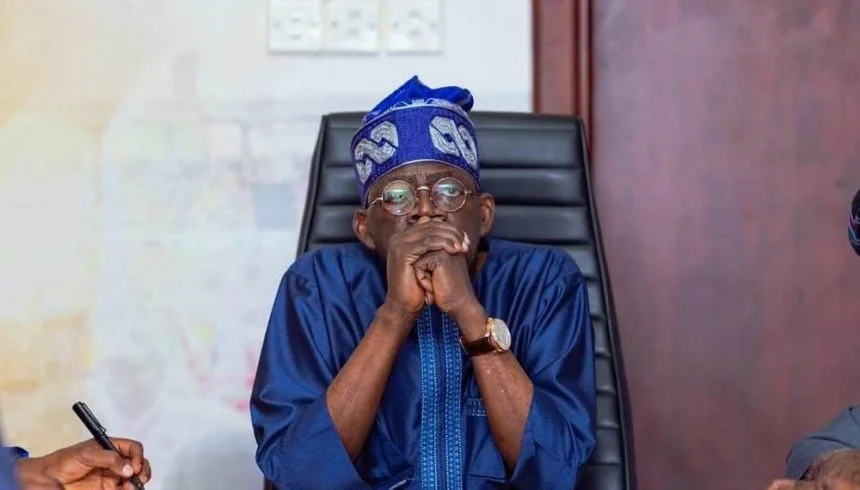News
President Bola Tinubu’s Fuel Subsidy Removal Palliative; Too LittleTo Make A Dent — Group Says

Eaglesforesight: To achieve accelerated coverage, Government must be ready to part fund informal workers’ contribution to the health and pension funds just as employers’ part fund workers in the organized sectors.
The group, Federation of Informal Workers Organization of Nigeria, FIWON, has through the group general secretary, Mr Gbenga Komolafe raise their displeasure to question President Bola Ahmed Tinubu’s Government over the Palliatives planned to give the vulnerable after the fuel subsidy had been removed.
Recall that on May 29th 2023 during inaugural speech of President Bola Ahmed Tinubu, he specifically stated it that subsidy on fuel has been removed.
However, many has demanded for a relief after the fuel subsidy removal, which might has likely caused and bring the idea of palliative.
Below read the full press statement of Federation of Informal Workers Organization of Nigeria, FIWON:
“The recently announced palliative measure by President Bola Tinubu ostensibly to cushion the effect of petroleum subsidy removal is pathetically too little to make any difference in reliving the overwhelming helplessness that has enveloped Nigeria as poverty holds increasing number of poor working Nigerians in vicious grip.”

King Victor Nigeria Enterprises
“Reeling under the effect of the ill fated currency redesign policy implemented in the first few months of the year, a policy which inflicted unimaginable suffering on most Nigerians especially those working in the informal economy, resulted in the destruction of millions of micro and small businesses.”
“The combined effect of the subsequent removal of subsidies on premium motor spirit which spiked the pump price per liter by as much as 300% in some parts of the country as well as the devaluation of the naira announced by the President is already being felt in the astronomical rise in the cost of the most basic essentials, especially food and transportation.”
“As reported in the media, the grant ‘will enable the transfer of the sum of eight thousand naira (N8,000) monthly to twelve (12) million poor and low-income households for a period of six months with a multiplier effect on about sixty (60) million individuals.’ The grants will be disbursed through the much abused ‘Conditional Cash Transfer’ window.”
“The first issue with this is that the amount of money to be disbursed to beneficiaries is truly so paltry. N8000 naira or about USD10 per month in today’s exchange rate really cannot feed a child of 5 years in 30 days talk less of supporting ‘…all vulnerable Nigerians’ to meet the cost of basic needs’ as announced under the programme.”
Related News:
- Subsidy Removal: In Four Weeks, We Saves N400bn — FG
- Tinubu Discloses When Nigerians Will Get Fuel Subsidy Palliatives From Government
- Subsidy Removal: Allocations To States Doubled In June, Senator Gbenga Daniel Reveals
“We would also question how they arrived at the figure of ‘12 million poor and low income households’ in a country with over 130 million people suffering from ‘multi dimensional poverty’ according to official statistics.”
“Who are these 12 million Nigerians, how were they identified? It is critical to raise this because similar programs in the past suffered so much from poor targeting that relatively privileged Nigerians had their accounts credited with N10,000 ‘MarketMoni” while most market women only heard about the program on the radio.”
“Under the Federal Government National Social Investment Programme (NSIP), easily the most ambitious financial intermediation programme in recent decades, similar programs to this newly announced program were implemented especially between 2017 and 2019 with billions of dollars invested in them.”
“But development experts and observers have lamented the ‘unprecedented lack of transparency and accountability’ witnessed in fund application especially with regard to Tradermoni aspect of GEEP. The programs were bedeviled with so much politicization, ethnicity, favouritism and nepotism brought to bear on the generation of data and other vital indicators.”
“We therefore use this occasion to call on the federal government to urgently revise the National Social Protection Policy to practically address the problem of exclusion of informal workers from old age support system, maternity care and support system as well as the need for accident insurance.”
“Existing structures created to address these issues such as NHIS and MPP hardly scratch the surface of the challenge of coverage. 90 per cent of working people in the informal economy cannot continue to be excluded from social protection mechanisms while we pretend to be fighting poverty! To achieve accelerated coverage, Government must be ready to part fund informal workers’ contribution to the health and pension funds just as employers’ part fund workers in the organized sectors.”

King Victor Nigeria Enterprises
“Lastly, massive macro economic leakages through which the country is ripped off of billions of dollars annually must be plugged to save funds critically needed for social and physical infrastructural provisioning; crude oil thefts, ridiculously high remuneration package of political office holders, bloated government appointments, unnecessary import waivers, toxic loans piled up by the high and mighty will easily fund development projects to help overcome the scourge of of poverty and misery in the country.”
“We urge President Bola Tinubu to display the same zest and zeal to deal with these challenges, the same way he has addressed the issue of petroleum subsidy.”
Yours faithfully,
Gbenga Komolafe,
General Secretary






















